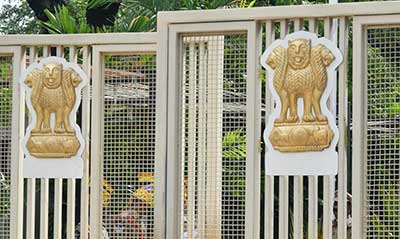Date: 31/10/2022
Relevance: GS-2: Functions and Responsibilities of the Union and the States, Issues and Challenges Pertaining to the Federal Structure
Key Phrases: Article 164 of the Constitution, the pleasure of the Governor, withdrawal of pleasure, Shamsher Singh vs State of Punjab (1974), Constituent Assembly, titular head, Government of India Act, of 1935.
Why in News?
- A tweet put out recently by the office of the Kerala Governor said that the statements of individual Ministers that lower the dignity of the office of the Governor can invite action including withdrawal of pleasure.
Important articles regarding the issue:
- Article 164 of the Constitution says the Chief Minister shall be appointed by the Governor and other Ministers shall be appointed by the Governor on the Chief Minister’s advice, adding that “the Ministers shall hold office during the pleasure of the Governor”.
- Article 163(1): There shall be a council of Ministers with the Chief Minister at the head to aid and advise the Governor in the exercise of his functions, except in so far as he is by or under this constitution required to exercise his functions or any of them in his discretion.
- Article 163(2) says that the Governor can act at his discretion in certain matters as permitted by the Constitution.
Constitutional facets:
- The function of the appointed Governor is always subject to the policies of the elected government, and not vice-versa. This is a foundational theory of India’s constitutional democracy.
- Constitutional provisions cannot be read in isolation and article 164 should be read with article 163(1).
- The Governor is generally bound by the Cabinet decision except when he has a legitimate right to invoke his discretion under article 163(2).
- Article 164, which contains the provision relevant in the context of the Kerala Governor’s tweet and the letter is inseparable from Article 163.
- Therefore, it follows that unless the Cabinet or the Chief Minister advises the expulsion of a Minister, the Governor cannot cause the exit of a particular Minister by “withdrawing pleasure”.
Shamsher Singh vs State of Punjab (1974):
- In Shamsher Singh, for comparison, the Supreme Court
extracted Dr. B.R. Ambedkar’s introductory statement made on
November 4, 1948, in the Constituent Assembly, which said:
- “The President of the United States is not bound to accept any advice tendered to him by any of his secretaries. The President of the Indian Union will be generally bound by the advice of his Ministers. He can do nothing contrary to their advice nor can he do anything without their advice. The President of the United States can dismiss any Secretary at any time. The President of the Indian Union has no power to do so, so long as his Ministers command a majority in Parliament”.
- The same principles apply to the Governors as well, since the Union Minister also holds the office “during the pleasure of the President” as in Article 75(2) of the Constitution.
- “Withdrawal of pleasure”, without advice from the Council of Ministers, as indicated by the office of the governor is a misconception.
A titular head:
- The draft Constitution, prepared by the Constitutional Adviser in October 1947, contained Article 126, according to which, “Governor’s Ministers shall be chosen and summoned by (the Governor) and shall hold office during his pleasure”.
- This Article, which was made part of the draft of the erstwhile Article 144, was discussed at length in the Constituent Assembly. The general discretion with the Governor was taken away, and the Cabinet was given the authority to rule.
- Amendment to the draft Article 144 moved by B.R. Ambedkar resulted in the present constitutional scheme of Articles 163 and 164.
- According to the scholar Subhash C. Kashyap, “The words ‘during pleasure’ were, always understood to mean that the ‘pleasure’ should not continue when the Ministry had lost the confidence of the majority; and the moment the Ministry lost the confidence of the majority, the Governor would use his ‘pleasure’ in dismissing it”.
- Therefore, the Article implies that the Governor is only a titular head of the State and that if the Cabinet has a majority, the Governor cannot act against the Cabinet.
Addressing a concern:
- The Governor’s office has a colonial origin. The Government of India Act, of 1858 situated the post of Governor under the supervision of the Governor General.
- According to the Government of India Act, of 1935, Governors were to act based on the advice of the Provincial Government.
- The potential danger that could be posed by the continuation of the colonial institution was a matter of concern for the makers of the Constitution.
- During the deliberations of the constituent assembly over the question of any guarantee against abuse of power by the Governor it was concluded that the guarantee is of the Governor’s wisdom and the wisdom of the authority that will appoint the Governor.
- But this issue of the Constitution was to be translated to a level of judicial realism and pragmatism, which the Supreme Court did in the Shamsher Singh case thus the judgment of the Constitution Bench will prevail over the Governor’s tweets.
Conclusion:
- The governors of the states are expected to defend the Constitution and should use their powers to caution elected regimes against violating the Constitution, but this does not mean that they can use the discretionary space given to them to function as a parallel power centre.
- The governors should act in a nonpartisan way while fulfilling their constitutional duties and the parliament should consider the recommendations of various commissions to reform the office of the governor further for a better and healthy democracy.
Source: The Hindu
Mains Question:
Q. The function of the appointed Governor, who is bound by the constitutional scheme, is always subject to the policies of the elected government, and not vice-versa. Discuss in light of the recent controversy over the office of governor in the state of Kerala.






















